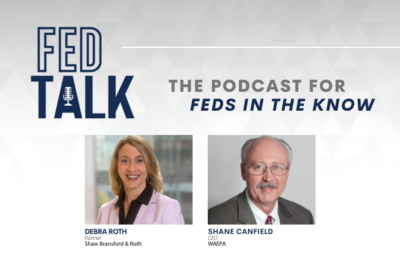It’s never too early in the year to think about life insurance
Lots of people make financial resolutions early in a calendar year. Here's one that's east to follow through on: Life insurance. How much do you really need and...
Lots of people make financial resolutions early in a calendar year. Here’s one that’s east to follow through on: Life insurance. How much do you really need and where do you find the best deal? For advice and answers, the Federal Drive with Tom Temin talks with the well-insured Abe Grungold of AG Financial Services.
Interview Transcript:
Tom Temin Yes. Thinking about what happens after you die, which was when your life insurance would pay off. But what are your thoughts? Because my understanding is that life insurance requirements change throughout your life cycle.
Abe Grungold Yeah, life insurance is one of these products that you really need through your life. And I always had life insurance during my federal career because you need to cover the amount of debt that you owe. You need to be able to leave something aside for a funeral, which are very expensive these days. And if you have dependents, you need to set aside money to care for your dependents that they have something right.
Tom Temin And life insurance takes many forms. I guess for most feds, the most common is the federally the official federally issued insurance, correct?
Abe Grungold Yes. FEGLI is insurance that the government immediately signed you up for it when you first are employed, and you actually have to fill out a form to get out of FEGLI. But the good thing about FEGLI is there are no requirements to obtain FEGLI as far as a physical or a questionnaire regarding your health, and you automatically can obtain life insurance. You just have to decide how much life insurance you want, but it can be a little pricey compared to other options that are available outside of the government.
Tom Temin And the FEGLI insurance or those outside of the government are basic pay as you go death benefit. They’re not whole life. They’re not savings types of plans. They’re simply term insurance.
Abe Grungold Well, unfortunately, the companies outside of the government offer of all types of universal life, whole life, term life, and many other types of insurance products. I always had my life insurance outside of the government, and I always selected a term life insurance policy, whether I had it per year or I had a 20-year policy. I always felt that term life insurance provided the best life insurance coverage that fit my needs, and it was also very, very affordable. And I had a 20-year term life policy when I got married. I felt that was what was needed for both me and my wife.
Tom Temin So term is you pay a monthly or yearly premium and you get a specific death benefit and that’s it. There’s no more savings associated with it. There’s no value in some kind of annuity policy or anything like the old whole life and similar types of programs, or I guess they have hybrid programs and universal life and all of these other products.
Abe Grungold That’s correct. This though, cash surrender value. And before I was employed with the government, I had a whole life policy that I had through a company outside of the government. And this was before I started with the government. And years into the policy, I saw that it was necessary for me to terminate this type of insurance because it got expensive, and it didn’t fit my needs. When I had this whole life policy before I started with the government, I felt that it was too expensive, and I decided to terminate it once I had it for several years. I saw working for the government. There were other better insurance products out there, more affordable, and so I cashed in that whole life policy.
Tom Temin All right. And what about the issue of the amount you actually need as your death benefit? Let’s just talk about the straight death benefit. You mentioned the elements that go into figuring that as your income goes up, how do you make sure that your policy keeps up as you move through, say, the schedule, you know, and you get higher and higher salaries?
Abe Grungold Well, you can select it’s called 1x or one times your salary. So as your salary increases each year, the. Coverage of your insurance also increases. Or you can select 2x or 3x. And I have seen a lot of federal employees carry a lot of life insurance. They feel that it’s necessary to cover the vast amount of debt from their mortgage, and to provide security for their dependents in the event something happens to them.
Tom Temin The cost, though, is not linear, right? If you were to double your death benefit, say, from half a million to a million, does the premium double or does it go up by a certain percentage?
Abe Grungold Certainly the premium is going to be much, much more. And insurance at that level may not be affordable for you through a government sponsored life insurance policies. It would be best if you wanted to have 500,000 or $1 million of life insurance coverage to go outside of the government and obtain a term life insurance policy for those levels of coverage. It’ll be much more affordable.
Tom Temin Right. So, you could go to WAEPA or one of the commercial companies that would have these types of products, and it might give you a better deal than FEGLI.
Abe Grungold Yes. I had a company called Banner Life, and I had $250,000 of life insurance coverage, and it only cost me $300 a year, and it was a 20-year policy. I could not beat that type of coverage. Quality coverage. You want a quality life insurance company, and you want coverage that is going to be there for you, regardless of how well the company is doing. That’s very important. You have to get a company that has a good rating. So yes, I had that policy and I kept it until I reached retirement. And then I decided I didn’t need life insurance anymore. I didn’t have any debt, fortunately for me, and it just wasn’t something that my wife and I discussed that we were going to continue with because at that point it became much, much, much more expensive.
Tom Temin Right. So, you need to then reevaluate. Almost annually you would say.
Abe Grungold Yes when you get into your 60s life insurance triples and quadruples all the way up to very large premium amounts. But some people still feel it’s a good investment because to save that premium every year, they feel that it’s worth the gamble to pay the premium and to have that life insurance in the event something happens to them.
Tom Temin And FEGLI does not go with you into retirement. Correct?
Abe Grungold FEGLI does go with you into retirement. You do get, uh, at age 65, you do get $10,000 worth of free coverage when you reach age 65. But if you still want to continue FEGLI as a federal retiree, yes, you can continue it. You just pay the premium. And unfortunately, the premium will go up as you get older.
Tom Temin And $10,000 for free doesn’t buy as much. Frankly, if you don’t.
Abe Grungold No, it barely gets you a pine box I hate to say. You know, but it’s something very, very important about life insurance, very important Tom, and that you must have a beneficiary for your life insurance policy, and you must communicate with that beneficiary to let them know that a life insurance policy exists. Because many times people pass away and there’s no one to contact the insurance company to say, you know, this person passed away, the insurance company is not going to contact you. You have to contact them. And in many, many situations. And I know with FEGLI, you have to provide a certified death certificate. That’s very important. Otherwise, they won’t pay it out.
Tom Temin Yeah. So, whoever’s left over has to take care of all those details. And they have to know that they have to take care of them. In other words.
Abe Grungold Yes, you have to be the beneficiary and you have to prove that this person passed away. The insurance company is not going to do that for you.
Copyright © 2025 Federal News Network. All rights reserved. This website is not intended for users located within the European Economic Area.
Tom Temin is host of the Federal Drive and has been providing insight on federal technology and management issues for more than 30 years.
Follow @tteminWFED






